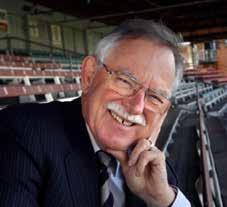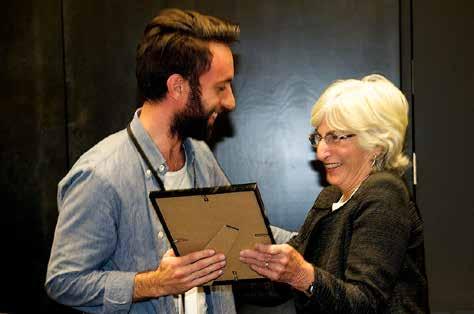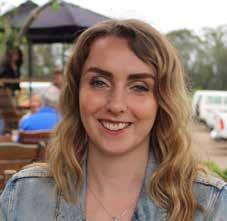
3 minute read
Thank you to our donors
From the Chair of the Florey Foundation Council, Mr Ross Oakley OAM
I would like to wholeheartedly thank you for continuing to give in 2020 during particularly uncertain times. COVID-19 has demonstrated now more than ever that Australia must continue to invest in medical research for the sake of our health and wellbeing.
As the Chair of the Foundation Council, I work side by side with the fundraising team and our mandate is to support medical research both now and in the future by prudently managing the donations and bequests you make to the Florey. We work closely with our scientists to ensure donations are directed to the areas of greatest need. By working together with our community partners and generous donors we ultimately enhance medical research into diseases of the brain and mind where and when it is needed, based on the potential for discovery.
I am very pleased to advise that the Florey Future Fund continues to grow and has now reached the milestone of $12.5 million. We’re especially thankful to the Dowd Family for their incredibly generous donation of $5 million to seed fund this endowment.
On behalf of the over 600 Florey scientists and students, thank you for joining in the fight against deadly diseases and illnesses, by helping to find better treatments and cures. We can’t do it alone, but together with your support and the hard work of our researchers, we have a fighting chance.
Laying the foundation for emerging researchers
The Florey would like to acknowledge the generosity of the Collier family through the John Collier Postdoctoral Travel Scholarship. Since 2013 the scholarship has recognised seven high-performing Florey scientists investigating Parkinson’s disease. The prize enables students to attend a recognised national or international scientific meeting, visit a laboratory for collaborative research or learn new techniques.
Since its inception, the prize has awarded $35,000 in funding to upcoming Florey researchers.
“My late husband John had Parkinson’s disease. I was his carer so I learnt a lot about it. After he passed away, my family and I decided to support research into Parkinson’s,” explained Deirdre Collier.
John had an illustrious career in mining and was the former chief executive of Gold and Minerals Product Group Rio Tinto. A passionate painter and keen cyclist, he was first and foremost committed to promoting young people and empowering youth.

In 2020, the award was given to Dr Niamh Moriarty who is conducting research on the development and improvement of stem cell therapies for Parkinson’s disease. After receiving the award, Niamh said, “I am extremely grateful. This will enable me to showcase my findings at international conferences in the fields of neural regeneration and stem cell therapy in Parkinson’s disease, while also giving me the opportunity to establish exciting new international collaborations.”
When asked what message John might have conveyed to Niamh, Deirdre didn’t have to think twice. “He would have said just go for it! Don’t have fixed ideas. Be adaptable.”
Deirdre is a mother of six and grandmother to thirteen. Despite her active lifestyle she has managed to stay in close contact with the Florey over the years. “I’ve been to some terrific lectures. I’ve also visited labs with my grandson who’s keen on science,” explained Deirdre.
“I remember talking to a student who was going to the labs at midnight to look after stem cells. I was amazed by his dedication; it is truly impressive.”
The impact of these gifts is also impressive. Associate Professor Scott Ayton was awarded the scholarship in 2016. Today, Scott is an accomplished mid-career Florey researcher leading the Translational Neurodegeneration Laboratory and collaborating with the world’s best to translate discoveries into clinical trials which offer new hope to patients with Parkinson’s and Alzheimer’s.
Scott used his John Collier Postdoctoral Travel Scholarship to present his early research at conferences, develop professional networks and meet peers from across the globe. He explained, “So many of the connections I made during that time are part of the collaborations I am working in today.” His trajectory is testament to the transformative nature of these gifts.
“When you give a scholarship, the investment goes well beyond that one event or project. You’re investing in a career. Every donation builds on the foundations of that person. A gift of this nature provides building blocks for a career, and we all know every bit helps,” concluded Scott.
John Collier Postdoctoral Travel Scholarship recipients

2020 Dr Niamh Moriarty, postdoctoral researcher in the Florey’s Stem Cells and Neural Development Laboratory
2019 Dr Rachel McQuade, now an NHMRC Emerging Leader Fellow
2018 Dr Jennifer Hollands, now government and academic liaison at an Australian commercial entity which leads cutting edge manufacturing for cancer and rare diseases
2017 Dr Erin McAllum, now project manager for the BioMedTechHorizons program at the Australian Government’s MedTech and Pharma Growth Centre, MTP Connect

2016 Associate Professor Scott Ayton, now head of the Translational Neurodegeneration Laboratory at the Florey
2015 Dr Ting-Yi Wang, now a postdoctoral research fellow investigating targeted drug delivery and nanotechnology
2014 Dr Jonathan Niclis, now a specialist scientist at a leading international healthcare company




